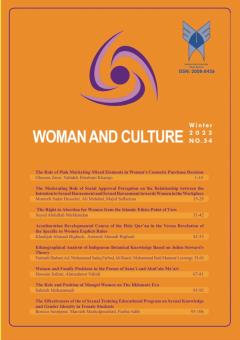Acculturation Developmental Course of the Holy Qur'an in the Verses Revelation of the Specific to Women Explicit Rules
Subject Areas : Sociology
Khadijeh Ahmadi Bighash
1
*
,
Ameneh Ahmadi Bighash
2
![]()
1 - Assistant Professor, Department of Quran and Hadith, Faculty of Humanities, Tarbiat Modares University, Tehran, Iran.
2 - PhD student, Department of Quran and Hadith, Faculty of Quran and Hadith Sciences,University of Islamic Mazaheb, Tehran, Iran.
Keywords: Specific for women rulings verses, Acculturalization of the Holy Qur'an, The developmental course,
Abstract :
The aim of the current research was to investigate the acculturation developmental course of the holy Qur'an in the verses revelation of the specific to women explicit rules. The universe of the study included all the verses of the Holy Quran. The research sample embraced the specific to women explicit rulings verses. The research design was descriptive-analytical. To collect data, the verses of the Holy Quran, interpretive, narrative and historical sources were reviewed via the library method. Then the data were analyzed. The findings of the research showed: The Quran is a universal book for the guidance of all mankind, which in the process of its revelation, in addition to the transmission of the text, also provided the audience with the method to realize its educational dimensions well through acculturalization. One of the most important categories of the Qur'an are the specific to women rulings verses, which are implicitly mentioned in the Meccan surah, and explicitly in the Madani surah, in topics such as: menstruation, breastfeeding period, eddeh (waiting period after divorce during which a woman cannot remarry), chastity and modesty, ghaz al-basr (staring to the men), etc. have been mentioned. Focusing on the revelation of explicit verses specific to women in the process of revelation, telling from a kind of gradual culture building in order to fight and invalidate superstitions and ignorance, preparing to accept rulings, and planning them from the simplest to the most difficult, in line with the gradual preparation and training of the audience to accept women's rights, respect their status, and promote the human character of women on the age of decline in society.
The Holy Quran
Allameh Majlisi, M. (1984). Bihar al-Anwar. Tehran: Islamic Publishing House. URL: http://islamquest.net/fa/archive/fa424
Aroosi Hawizi, A. (1995). Tafsir Noor al-Saqlain. Qom: Ismailian. URL:http: www.alvahy.com.30
Asqlani, I. (1995). al-Asaba fi Tami'iz al-Sahaba. Beirut: Dar al-Kitab al-Alamiya. URL: https://http:www.fa.islamtape.com/article/art/4949
Behjatpur, A. (2018). The method of creating a culture of chastity in the Qur'an. Qom: Hajar Publishing Center. [Persian] URL: https://journals.atu.ac.ir/article_10329.html
Brarian. B. (2017). Rereading the verses of Al-Ahkam related to women in Surah Nasa. Tehran: Fiqh and Law. [Persian] URL: https://rjqk.atu.ac.ir/article_10329.html
Daruaze, Q. (2004). al-Tafsir al-Hadith. Cairo: Darahia. URL: https://quran.isca.ac.ir/fa/Article/Detail/22829
Esadi Tajani, F. (1996), the position of women in Iranian criminal law and public jurisprudence. Tehran: Hohza. [Persian] URL: https://elmnet.ir/article/10783954-24166
Har Ameli, M. (1996). Wasal al-Shia. Qom: Ahl al-Bayt Institute. http://ensani.ir/fa/article/2039
Jurjani, A. (1998). Jala-ul-Azhan & Jala-e-Ahzan. Tehran: Semit. URL: https://hawzah.net/fa/Article/View/5199/
Koleini, M. (1990). Al-Kafi. Tehran: Al-Islamiya. URL: https://civilica.com/doc/733626/
Makarem Shirazi, Sh. (1995). Tafsir Nemiuneh. Qom: Darul Kitab al-Islamiya. [Persian] URL: http://www.makarem.ir/main.aspx?typeinfo=21&lid=0&catid=28148&mid=263432
Memarian, Z. (2017), Rereading the verses of Al-Ahkam related to women in Surah Nasa. Tehran: Research in Fiqh. [Persian] URL: https://elmnet.ir/article/20746955-93215/
Qureshi, A. (1994). Ahsan Al-Hadith. Tehran: Baath Foundation. [Persian] URL: http://www.imamalinet.net/fa/Question/View/10427
Rawandi, Q. (1987). Fiqh al-Qur'an fi Sharh Ayat al-Ahkam. Qom: Ayatollah Murashi Najafi Library. URL: http://ensani.ir/file/download/article/1611997859-1036099-63.pdf
Salehi Ghaffari, M. (1985). Ayat al-Nisa: The verses of rulings on women. Tehran: Burhan Publications. URL: https://quran.isca.ac.ir/fa/Article/Detail/7361/
Shahabi, M. (1996). Advar Fiqh. Tehran: Ministry of Culture and Islamic Guidance. [Persian] URL: https://lib.eshia.ir/80767/1/0
ShaneChi, K. (1999). Ayat al-Ahkam. Tehran: side. ]Persian[ URL: https://mesbahyazdi.ir/node/147/
Siyuti, J. (1984). Al-Dar al-Manthor fi Tafsir al-Mathor. Qom: Ayatollah Murashi Najafi Library. URL: https://civilica.com/doc/669606/
Tabarsi, F. (1993). Majma al-Bayan fi Tafsir al-Qur'an. Tehran: Nasser Khosro. URL: https://hedayatgar.ir/fa/news/4195/
Tabatabai, M. (1997). Al-Mizan fi Tafsir al-Qur'an. Qom: the community of teachers of Qom seminary. URL: http://ensani.ir/fa/article/1889/
Tamimi Maghribi, M. (2006). Da'ayim al-Islam. Qom: Al-Al-Bayt Institute. URL: https://hawzah.net/fa/Magazine/View/89/6744/80550/
Vahedi Nishabouri, A. (1991). Asbab Al-Nouzol the Qur'an. Beirut: Dar al-Kitab Al-Alamiya. [Persian] URL: http://www.maarefquran.com/fa/Article/Detail/262/
_||_
